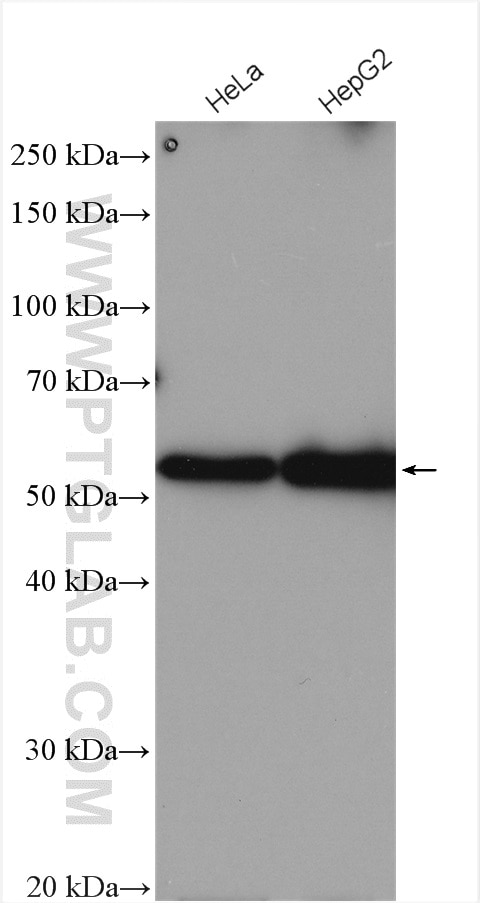UBR7 Polyklonaler Antikörper
UBR7 Polyklonal Antikörper für WB, ELISA
Wirt / Isotyp
Kaninchen / IgG
Getestete Reaktivität
human
Anwendung
WB, ELISA
Konjugation
Unkonjugiert
Kat-Nr. : 16903-1-AP
Synonyme
Galerie der Validierungsdaten
Geprüfte Anwendungen
| Erfolgreiche Detektion in WB | HeLa-Zellen, HepG2-Zellen |
Empfohlene Verdünnung
| Anwendung | Verdünnung |
|---|---|
| Western Blot (WB) | WB : 1:2000-1:10000 |
| It is recommended that this reagent should be titrated in each testing system to obtain optimal results. | |
| Sample-dependent, check data in validation data gallery | |
Produktinformation
16903-1-AP bindet in WB, ELISA UBR7 und zeigt Reaktivität mit human
| Getestete Reaktivität | human |
| Wirt / Isotyp | Kaninchen / IgG |
| Klonalität | Polyklonal |
| Typ | Antikörper |
| Immunogen | UBR7 fusion protein Ag10445 |
| Vollständiger Name | ubiquitin protein ligase E3 component n-recognin 7 (putative) |
| Berechnetes Molekulargewicht | 48 kDa |
| Beobachtetes Molekulargewicht | 48-60 kDa |
| GenBank-Zugangsnummer | BC015046 |
| Gene symbol | UBR7 |
| Gene ID (NCBI) | 55148 |
| Konjugation | Unkonjugiert |
| Form | Liquid |
| Reinigungsmethode | Antigen-Affinitätsreinigung |
| Lagerungspuffer | PBS mit 0.02% Natriumazid und 50% Glycerin pH 7.3. |
| Lagerungsbedingungen | Bei -20°C lagern. Nach dem Versand ein Jahr lang stabil Aliquotieren ist bei -20oC Lagerung nicht notwendig. 20ul Größen enthalten 0,1% BSA. |
Hintergrundinformationen
UBR7 (C14orf130), is a 425-amino-acid putative E3 ubiquitin-protein ligase which is a component of the N-end rule pathway. The N-end rule pathway is a ubiquitin-dependent system where E3 ligases called N-recognins, including UBR1, UBR2 and UBR7 (N-recognin-7), leading to target protein ubiquitination and subsequent degradation (PMID: 19008229). UBR7 contains a PHD-type zinc finger and a UBR-type zinc finger domain (PMID: 14702039), and probably undergoes acetylation (PMID: 19413330). Till date its precise function is not well known. Proteintech's UBR7 antibody 16903-1-AP is able to detect UBR7 with a theoretical MW of 48 kDa.
Protokolle
| Produktspezifische Protokolle | |
|---|---|
| WB protocol for UBR7 antibody 16903-1-AP | Protokoll herunterladen |
| Standard-Protokolle | |
|---|---|
| Klicken Sie hier, um unsere Standardprotokolle anzuzeigen |


